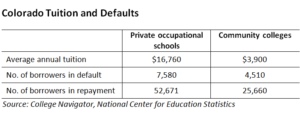Charles Brennan provided testimony in support of House Bill 24-1129, Protections for Delivery Network Company Drivers. CCLP is in support of HB24-1129.
Recent articles
CCLP testifies in support of TANF grant rule change
CCLP's Emeritus Advisor, Chaer Robert, provided written testimony in support of the CDHS rule on the COLA increase for TANF recipients. If the rule is adopted, the cost of living increase would go into effect on July 1, 2024.
CCLP testifies in support of updating protections for mobile home park residents
Charles Brennan provided testimony in support of House Bill 24-1294, Mobile Homes in Mobile Home Parks. CCLP is in support of HB24-1294.
CCLP’s legislative watch for April 5, 2024
For the 2024 legislative session, CCLP is keeping its eye on bills focused on expanding access to justice, removing administrative burden, preserving affordable communities, advocating for progressive tax and wage policies, and reducing health care costs.
Help students educate themselves about private occupational schools

Under the best circumstances, private occupational schools offer students a chance to update their skills for today’s competitive job market. For those who struggle to pay their bills, these schools potentially offer better job opportunities, a new career ladder to a higher income and an improved quality of life. Yet, many people who enroll in private occupational schools find that they don’t always deliver upon the promises advertised on late-night TV.
A private occupational school is a privately owned and operated post-secondary school that charges tuition to teach vocational or occupational skills. There are well over 300 such schools in Colorado approved to provide training in career fields as diverse as computer technology, nursing, real estate, cosmetology, massage therapy and trucking.
For-profit occupational schools are an important part of the post-secondary education landscape in Colorado. The share of jobs that only require a high school diploma has been shrinking, while jobs requiring some additional training are on the rise. By 2020, the Department of Higher Education projects that 74 percent of all jobs in Colorado will require some level of post-secondary training.
However, these institutions have faced increased scrutiny for a number of reasons. Tuition at private occupational schools is typically substantially higher compared to community colleges. Furthermore, students who attend these schools are less likely to find gainful employment and often leave school with more debt.

Nationally, the surge in student loan defaults in the last decade was largely concentrated among relatively older, low-income students who attended for-profit colleges. Last year, ITT, a large, for-profit technical school with facilities in Colorado, shuttered after the U.S. Department of Education issued an order forbidding the school from enrolling new students who depend on federal financial aid – the main source of ITT’s revenue. The restriction was issued in response to concerns about ITT’s recruitment and financial practices.
Given this context, it’s important that these schools make information available so that prospective students can make informed decisions about what types of training to pursue and what programs will prepare them for gainful employment.
In 2015, CCLP sought to amend the reauthorization act of the Division of Private Occupational Schools (DPOS) to strengthen the consumer information and protection role of the division in overseeing private schools. Although the amendment was unsuccessful, CCLP later met with the Division of Private Occupational Schools seeking to strengthen the disclosure of consumer information such as graduation and job placement rates.
CCLP and the Colorado Skills2Compete Coalition explored possible remedies to enhance transparency of these institutions for the 2017 legislative session. One result of our work, Senate Bill 118, sponsored by Sen. Rhonda Fields, D-Aurora, would require private occupational schools to provide information about educational outcomes (such as completion rates, total costs, estimated debt load and average starting salaries), before students sign a contract. The legislation also calls for the state to include cost and outcome information on an existing website to help students make informed decisions when investing in a secondary education.
As we all know, education is key to economic self-sufficiency. Colorado students have many choices for postsecondary education and training. Among these choices, prospective students have a tremendous amount of comparative and easily accessible information on costs and outcomes for public two and four year schools and eligible training providers under the Workforce Investment and Opportunity Act. A small percentage of the more than 300 private occupational schools in the state are featured on websites students use to compare information on costs and outcomes. SB 118 attempts to make the information readily available to consumers who are prepared to invest time and money for a better future.
SB 118 would make it easier for prospective students to get the information they need and to spend their education dollars wisely.
– Chaer Robert





